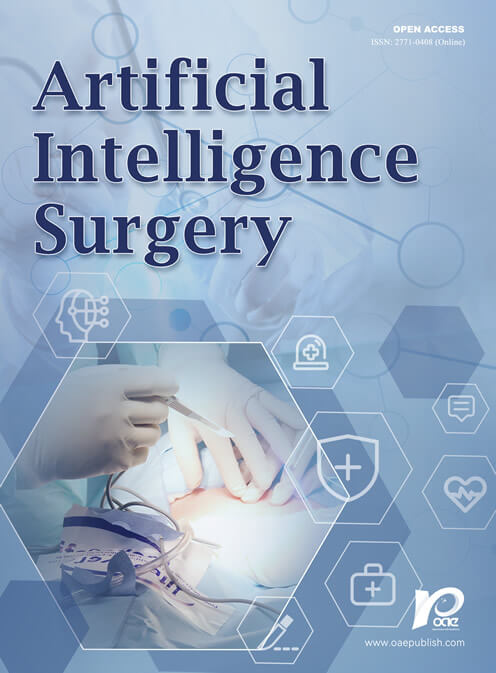REFERENCES
1. Zhao M, Tang Y, Kim H, Hasegawa K. Machine learning with K-means dimensional reduction for predicting survival outcomes in patients with breast cancer. Cancer Inform 2018;17:1176935118810215.
2. Elemento O, Leslie C, Lundin J, Tourassi G. Artificial intelligence in cancer research, diagnosis and therapy. Nat Rev Cancer 2021;21:747-52.
3. Jordan MI, Mitchell TM. Machine learning: trends, perspectives, and prospects. Science 2015;349:255-60.
4. Xu Y, Liu X, Cao X, et al. Artificial intelligence: a powerful paradigm for scientific research. Innovation 2021;2:100179.
5. Egger J, Gsaxner C, Pepe A, et al. Medical deep learning - a systematic meta-review. Comput Methods Programs Biomed 2022;221:106874.
6. Handelman GS, Kok HK, Chandra RV, Razavi AH, Lee MJ, Asadi H. eDoctor: machine learning and the future of medicine. J Intern Med 2018;284:603-19.
7. Maier-Hein L, Eisenmann M, Sarikaya D, et al. Surgical data science - from concepts toward clinical translation. Med Image Anal 2022;76:102306.
8. Sung H, Ferlay J, Siegel RL, et al. Global cancer statistics 2020: GLOBOCAN estimates of incidence and mortality worldwide for 36 cancers in 185 countries. CA Cancer J Clin 2021;71:209-49.
9. Maier-Hein L, Vedula SS, Speidel S, et al. Surgical data science for next-generation interventions. Nat Biomed Eng 2017;1:691-6.
11. Inchingolo R, Maino C, Cannella R, et al. Radiomics in colorectal cancer patients. World J Gastroenterol 2023;29:2888-904.
12. Liberati A, Altman DG, Tetzlaff J, et al. The PRISMA statement for reporting systematic reviews and meta-analyses of studies that evaluate health care interventions: explanation and elaboration. J Clin Epidemiol 2009;62:e1-34.
13. Tricco AC, Lillie E, Zarin W, et al. PRISMA extension for scoping reviews (PRISMA-ScR): checklist and explanation. Ann Intern Med 2018;169:467-73.
14. Pollock D, Peters MDJ, Khalil H, et al. Recommendations for the extraction, analysis, and presentation of results in scoping reviews. JBI Evid Synth 2023;21:520-32.
15. Kitaguchi D, Harai Y, Kosugi N, et al. Artificial intelligence for the recognition of key anatomical structures in laparoscopic colorectal surgery. Br J Surg 2023;110:1355-8.
16. Kojima S, Kitaguchi D, Igaki T, et al. Deep-learning-based semantic segmentation of autonomic nerves from laparoscopic images of colorectal surgery: an experimental pilot study. Int J Surg 2023;109:813-20.
17. Ryu S, Goto K, Kitagawa T, et al. Real-time artificial intelligence navigation-assisted anatomical recognition in laparoscopic colorectal surgery. J Gastrointest Surg 2023;27:3080-2.
18. Park SH, Park HM, Baek KR, Ahn HM, Lee IY, Son GM. Artificial intelligence based real-time microcirculation analysis system for laparoscopic colorectal surgery. World J Gastroenterol 2020;26:6945-62.
19. Okamoto N, Rodríguez-Luna MR, Bencteux V, et al. Computer-assisted differentiation between colon-mesocolon and retroperitoneum using hyperspectral imaging (HSI) technology. Diagnostics 2022;12:2225.
20. Beaulieu RJ, Goldstein SD, Singh J, Safar B, Banerjee A, Ahuja N. Automated diagnosis of colon cancer using hyperspectral sensing. Int J Med Robot 2018;14:e1897.
21. Manni F, Fonolla R, der Sommen FV, et al. Hyperspectral imaging for colon cancer classification in surgical specimens: towards optical biopsy during image-guided surgery. Annu Int Conf IEEE Eng Med Biol Soc 2020;2020:1169-73.
22. Jansen-Winkeln B, Barberio M, Chalopin C, et al. Feedforward artificial neural network-based colorectal cancer detection using hyperspectral imaging: a step towards automatic optical biopsy. Cancers 2021;13:967.
23. Collins T, Bencteux V, Benedicenti S, et al. Automatic optical biopsy for colorectal cancer using hyperspectral imaging and artificial neural networks. Surg Endosc 2022;36:8549-59.
24. Baltussen EJM, Kok END, Brouwer de Koning SG, et al. Hyperspectral imaging for tissue classification, a way toward smart laparoscopic colorectal surgery. J Biomed Opt 2019;24:1-9.
25. Tkachenko M, Chalopin C, Jansen-Winkeln B, Neumuth T, Gockel I, Maktabi M. Impact of pre- and post-processing steps for supervised classification of colorectal cancer in hyperspectral images. Cancers 2023;15:2157.
26. Jalal NA, Abdulnaki Alshirbaji T, Möller K. Evaluating convolutional neural network and hidden markov model for recognising surgical phases in sigmoid resection. Curr Dir Biomed Eng 2018;4:415-8.
27. Kitaguchi D, Takeshita N, Matsuzaki H, et al. Real-time automatic surgical phase recognition in laparoscopic sigmoidectomy using the convolutional neural network-based deep learning approach. Surg Endosc 2020;34:4924-31.
28. Kitaguchi D, Takeshita N, Matsuzaki H, et al. Deep learning-based automatic surgical step recognition in intraoperative videos for transanal total mesorectal excision. Surg Endosc 2022;36:1143-51.
29. Kitaguchi D, Takeshita N, Matsuzaki H, et al. Computer-assisted real-time automatic prostate segmentation during TaTME: a single-center feasibility study. Surg Endosc 2021;35:2493-9.
30. Kolbinger FR, Bodenstedt S, Carstens M, et al. Artificial intelligence for context-aware surgical guidance in complex robot-assisted oncological procedures: an exploratory feasibility study. Eur J Surg Oncol 2023:106996.
31. Kitaguchi D, Takeshita N, Matsuzaki H, et al. Automated laparoscopic colorectal surgery workflow recognition using artificial intelligence: experimental research. Int J Surg 2020;79:88-94.
32. Kitaguchi D, Lee Y, Hayashi K, et al. Development and validation of a model for laparoscopic colorectal surgical instrument recognition using convolutional neural network-based instance segmentation and videos of laparoscopic procedures. JAMA Netw Open 2022;5:e2226265.
33. Maier-Hein L, Wagner M, Ross T, et al. Heidelberg colorectal data set for surgical data science in the sensor operating room. Sci Data 2021;8:101.
34. Ryu K, Kitaguchi D, Nakajima K, et al. Deep learning-based vessel automatic recognition for laparoscopic right hemicolectomy. Surg Endosc 2024;38:171-8.
35. Igaki T, Kitaguchi D, Kojima S, et al. Artificial intelligence-based total mesorectal excision plane navigation in laparoscopic colorectal surgery. Dis Colon Rectum 2022;65:e329-33.
36. Kitaguchi D, Takeshita N, Matsuzaki H, et al. Real-time vascular anatomical image navigation for laparoscopic surgery: experimental study. Surg Endosc 2022;36:6105-12.
37. Ryu S, Goto K, Imaizumi Y, Nakabayashi Y. Laparoscopic colorectal surgery with anatomical recognition with artificial intelligence assistance for nerves and dissection layers. Ann Surg Oncol 2024;31:1690-1.
38. Kumazu Y, Kobayashi N, Kitamura N, et al. Automated segmentation by deep learning of loose connective tissue fibers to define safe dissection planes in robot-assisted gastrectomy. Sci Rep 2021;11:21198.
39. Kitaguchi D, Teramura K, Matsuzaki H, Hasegawa H, Takeshita N, Ito M. Automatic purse-string suture skill assessment in transanal total mesorectal excision using deep learning-based video analysis. BJS Open 2023;7:zrac176.
40. Igaki T, Kitaguchi D, Matsuzaki H, et al. Automatic surgical skill assessment system based on concordance of standardized surgical field development using artificial intelligence. JAMA Surg 2023;158:e231131.
41. Kitaguchi D, Takeshita N, Matsuzaki H, Igaki T, Hasegawa H, Ito M. Development and validation of a 3-dimensional convolutional neural network for automatic surgical skill assessment based on spatiotemporal video analysis. JAMA Netw Open 2021;4:e2120786.
42. Kolbinger FR, Rinner FM, Jenke AC, et al. Anatomy segmentation in laparoscopic surgery: comparison of machine learning and human expertise - an experimental study. Int J Surg 2023;109:2962-74.
43. Sasaki S, Kitaguchi D, Takenaka S, et al. Machine learning-based automatic evaluation of tissue handling skills in laparoscopic colorectal surgery: a retrospective experimental study. Ann Surg 2023;278:e250-5.
44. Chiarello MM, Fransvea P, Cariati M, Adams NJ, Bianchi V, Brisinda G. Anastomotic leakage in colorectal cancer surgery. Surg Oncol 2022;40:101708.
45. Rencuzogullari A, Benlice C, Valente M, Abbas MA, Remzi FH, Gorgun E. Predictors of anastomotic leak in elderly patients after colectomy: nomogram-based assessment from the american college of surgeons national surgical quality program procedure-targeted cohort. Dis Colon Rectum 2017;60:527-36.
46. Wen R, Zheng K, Zhang Q, et al. Machine learning-based random forest predicts anastomotic leakage after anterior resection for rectal cancer. J Gastrointest Oncol 2021;12:921-32.
47. Shen Y, Huang LB, Lu A, Yang T, Chen HN, Wang Z. Prediction of symptomatic anastomotic leak after rectal cancer surgery: a machine learning approach. J Surg Oncol 2024;129:264-72.
48. Arezzo A, Migliore M, Chiaro P, et al; REAL Score Collaborators. The REAL (REctal Anastomotic Leak) score for prediction of anastomotic leak after rectal cancer surgery. Tech Coloproctol 2019;23:649-63.
49. Mazaki J, Katsumata K, Ohno Y, et al. A novel predictive model for anastomotic leakage in colorectal cancer using auto-artificial intelligence. Anticancer Res 2021;41:5821-5.
50. Adams K, Papagrigoriadis S. Creation of an effective colorectal anastomotic leak early detection tool using an artificial neural network. Int J Colorectal Dis 2014;29:437-43.
51. Shao SL, Li YK, Qin JC, Liu L. Comprehensive abdominal composition evaluation of rectal cancer patients with anastomotic leakage compared with body mass index-matched controls. World J Gastrointest Surg 2022;14:1250-9.
52. Baker SE, Monlezun DJ, Ambroze WL Jr, Margolin DA. Anastomotic leak is increased with Clostridium difficile infection after colectomy: machine learning-augmented propensity score modified analysis of 46 735 patients. Am Surg 2022;88:74-82.
53. Sammour T, Cohen L, Karunatillake AI, et al. Validation of an online risk calculator for the prediction of anastomotic leak after colon cancer surgery and preliminary exploration of artificial intelligence-based analytics. Tech Coloproctol 2017;21:869-77.
54. Lee SY, Kim CH, Kim YJ, Kim HR. Anastomotic stricture after ultralow anterior resection or intersphincteric resection for very low-lying rectal cancer. Surg Endosc 2018;32:660-6.
55. Sartori A, De Luca M, Fiscon V, Frego M, Portale G; CANSAS study working group. Retrospective multicenter study of post-operative stenosis after stapled colorectal anastomosis.
56. Su Y, Li Y, Chen W, Yang W, Qin J, Liu L. Automated machine learning-based model for predicting benign anastomotic strictures in patients with rectal cancer who have received anterior resection. Eur J Surg Oncol 2023;49:107113.
57. Shao S, Zhao Y, Lu Q, Liu L, Mu L, Qin J. Artificial intelligence assists surgeons’ decision-making of temporary ileostomy in patients with rectal cancer who have received anterior resection. Eur J Surg Oncol 2023;49:433-9.
58. Liu Y, Zhao S, Du W, et al. Applying interpretable machine learning algorithms to predict risk factors for permanent stoma in patients after TME. Front Surg 2023;10:1125875.
59. Kuo CY, Kuo LJ, Lin YK. Artificial intelligence based system for predicting permanent stoma after sphincter saving operations. Sci Rep 2023;13:16039.
60. Keane C, Fearnhead NS, Bordeianou LG, et al; LARS International Collaborative Group. International consensus definition of low anterior resection syndrome. Dis Colon Rectum 2020;63:274-84.
61. Qin Q, Huang B, Wu A, et al; Chinese Radiation Intestinal Injury Research Group. Development and validation of a post-radiotherapy prediction model for bowel dysfunction after rectal cancer resection. Gastroenterology 2023;165:1430-42.e14.
62. Huang MJ, Ye L, Yu KX, et al. Development of prediction model of low anterior resection syndrome for colorectal cancer patients after surgery based on machine-learning technique. Cancer Med 2023;12:1501-19.
63. Wang Z, Shao SL, Liu L, Lu QY, Mu L, Qin JC. Machine learning model for prediction of low anterior resection syndrome following laparoscopic anterior resection of rectal cancer: a multicenter study. World J Gastroenterol 2023;29:2979-91.
64. Wang K, Tang Y, Zhang F, Guo X, Gao L. Combined application of inflammation-related biomarkers to predict postoperative complications of rectal cancer patients: a retrospective study by machine learning analysis. Langenbecks Arch Surg 2023;408:400.
65. Lin V, Tsouchnika A, Allakhverdiiev E, et al. Training prediction models for individual risk assessment of postoperative complications after surgery for colorectal cancer. Tech Coloproctol 2022;26:665-75.
66. Wei R, Guan X, Liu E, et al. Development of a machine learning algorithm to predict complications of total laparoscopic anterior resection and natural orifice specimen extraction surgery in rectal cancer. Eur J Surg Oncol 2023;49:1258-68.
67. Merath K, Hyer JM, Mehta R, et al. Use of machine learning for prediction of patient risk of postoperative complications after liver, pancreatic, and colorectal surgery. J Gastrointest Surg 2020;24:1843-51.
68. Francis NK, Luther A, Salib E, et al. The use of artificial neural networks to predict delayed discharge and readmission in enhanced recovery following laparoscopic colorectal cancer surgery. Tech Coloproctol 2015;19:419-28.
69. Manilich E, Vogel JD, Kiran RP, Church JM, Seyidova-Khoshknabi D, Remzi FH. Key factors associated with postoperative complications in patients undergoing colorectal surgery. Dis Colon Rectum 2013;56:64-71.
70. Liu Y, Song C, Tian Z, Shen W. Identification of high-risk patients for postoperative myocardial injury after CME using machine learning: a 10-year multicenter retrospective study. Int J Gen Med 2023;16:1251-64.
71. Chen KA, Joisa CU, Stem JM, Guillem JG, Gomez SM, Kapadia MR. Improved prediction of surgical-site infection after colorectal surgery using machine learning. Dis Colon Rectum 2023;66:458-66.
72. Ohno Y, Mazaki J, Udo R, et al. Preliminary evaluation of a novel artificial intelligence-based prediction model for surgical site infection in colon cancer. Cancer Diagn Progn 2022;2:691-6.
73. Masum S, Hopgood A, Stefan S, Flashman K, Khan J. Data analytics and artificial intelligence in predicting length of stay, readmission, and mortality: a population-based study of surgical management of colorectal cancer. Discov Oncol 2022;13:11.
74. Ashraf Ganjouei A, Romero-Hernandez F, Conroy PC, et al. A novel machine learning approach to predict textbook outcome in colectomy. Dis Colon Rectum 2024;67:322-32.
75. Guidolin K, Ng D, Zorigtbaatar A, Chadi S, Quereshy F. A machine learning model to predict the need for conversion of operative approach in patients undergoing colectomy for neoplasm. Cancer Rep 2024;7:e1917.
76. Ruan X, Fu S, Storlie CB, Mathis KL, Larson DW, Liu H. Real-time risk prediction of colorectal surgery-related post-surgical complications using GRU-D model. J Biomed Inform 2022;135:104202.
77. Weller GB, Lovely J, Larson DW, Earnshaw BA, Huebner M. Leveraging electronic health records for predictive modeling of post-surgical complications. Stat Methods Med Res 2018;27:3271-85.
78. Chen D, Afzal N, Sohn S, et al. Postoperative bleeding risk prediction for patients undergoing colorectal surgery. Surgery 2018;164:1209-16.
79. Soguero-Ruiz C, Hindberg K, Rojo-Alvarez JL, et al. Support vector feature selection for early detection of anastomosis leakage from bag-of-words in electronic health records. IEEE J Biomed Health Inform 2016;20:1404-15.
80. Jo YY, Han J, Park HW, et al. Prediction of prolonged length of hospital stay after cancer surgery using machine learning on electronic health records: retrospective cross-sectional study. JMIR Med Inform 2021;9:e23147.
81. Strömblad CT, Baxter-King RG, Meisami A, et al. Effect of a predictive model on planned surgical duration accuracy, patient wait time, and use of presurgical resources: a randomized clinical trial. JAMA Surg 2021;156:315-21.
82. He K, Zhang X, Ren S, Sun J. Deep residual learning for image recognition. ArXiv. [Preprint.] Dec 10, 2015 [accessed on 2024 Oct 30]. Available from: https://doi.org/10.48550/arXiv.1512.03385.









